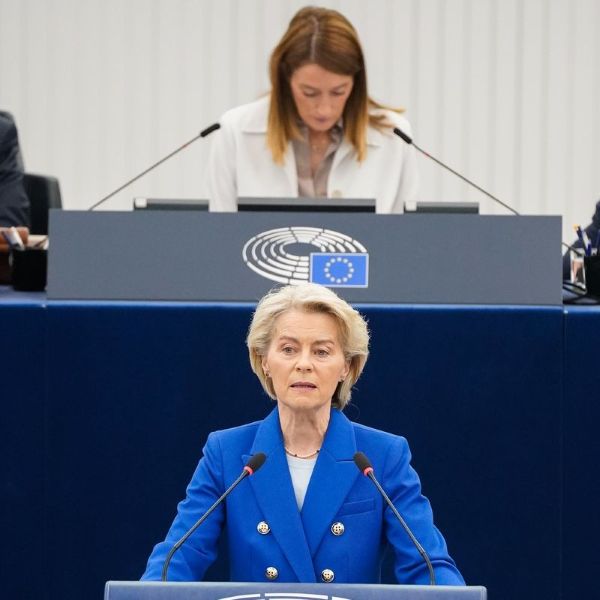On Wednesday, European Commission President Ursula von der Leyen expressed a critical warning regarding the necessity for the EU to actively address Russia’s “targeted grey zone campaign“ against Europe. She underscored that failure to respond will likely lead to further escalation of the situation.
Notably, in a span of just two weeks, a series of concerning incidents has occurred, including airspace violations, acts of sabotage, and cyberattacks. Incidents reported include breaches of Estonia’s airspace by fighter jets and drones overflying military bases and critical infrastructure in Belgium, Denmark, Germany, Poland, and Romania.
President von der Leyen emphasised the imperative for a decisive response from the EU and highlighted the urgency of thoroughly investigating each incident to ensure accountability. She reaffirmed that the sovereignty and safety of every member state’s territory must be upheld and protected.
“If we hesitate to act, the grey zone will only expand,“ she said.
The European Union’s executive branch is in the process of formulating a comprehensive plan to prepare Europe for emerging challenges by 2030. EU officials have indicated that there is a possibility of Russia launching an attack on another European nation within the next three to five years, The Associated Press reports.
This strategic plan includes the development of a “drone wall,“ which will consist of advanced technological systems designed to detect, track, and neutralise drones. Additionally, it aims to target their operating systems or ground personnel.
In two weeks, von der Leyen is set to present a detailed “road map“ to the heads of state and government of the 27-nation bloc, outlining measures to enhance Europe’s defences by the end of the decade.
Von der Leyen has emphasised the unsustainability of deploying the latest-generation fighter jets to counter relatively low-cost drones, as evidenced by recent incidents involving drones in Polish airspace.
“This is absolutely not sustainable. We need an anti-drone system that is affordable and fit for purpose. For swift detection, swift interception, and when needed, swift neutralisation,“ the Commission’s President said. She highlighted that Europe has much to learn from Ukraine in this regard.
The Commission maintains that a key strategy for encouraging European countries to enhance their defence investments is to highlight the potential for job creation and economic benefits within the region. It advocates that a minimum of 65% of any project funded with EU resources be executed on the continent. In recent years, member nations have allocated approximately two-thirds of their defence orders to U.S. companies.
“Most investment goes outside Europe. In other words, these are jobs outside Europe. This is absolutely not sustainable,“ von der Leyen said. “This is European money and we want to see a return on this investment in jobs here in Europe.”
During a recent summit in Copenhagen, certain European Union leaders exhibited a more resolute position regarding the ongoing security issues, including drone incidents, acts of sabotage, cyberattacks, and attempts to circumvent sanctions. While Denmark has not explicitly attributed a series of recent drone flights over its territory to Russia, French President Emmanuel Macron articulated the need for Europe to adopt a more assertive stance. He proposed that European nations should consider intercepting drones that violate their airspace and boarding vessels suspected of illicitly transporting oil, to diminish revenue streams supporting Moscow’s military endeavours.

